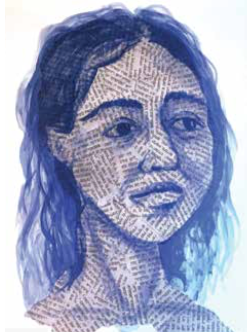
from “Women Sing of Family Violence”
Taking up the tradition of truth-telling in Yiddish music, we hear the dark stories in familiar tunes. [Spring 2011]

Art: Shifra Whiteman
Picture the stairwell in the poor apartment: the neighbor descends the steps and the woman in the doorway repeats, “Good night, good night,” and then haltingly speaks the words: “He hit me yesterday. I’m black and blue. I was ashamed to tell you. Good night.”
I found the song “Good Night, Brayne” in a 1984 anthology of Yiddish folksongs published by The Hebrew University while I was working with poet Irena Klepfisz and pianist Joyce Rosenzweig on the lives and writings of Yiddish-speaking women. Later, teaching an intergenerational work- shop at KlezKanada in Quebec, I asked the class if any of them knew this song. Hands went up. They had learned it as children in their secular Yiddish school, part of the relentless truth-telling that runs through Yiddish culture and the institutions that have taught its values. An East European Jewish folk song collected and preserved by Jewish folklorists in the 19th and early 20th centuries had served as part of a school lesson in 1950s Canada, although the only recorded versions of A Gutn Ovnt Brayne that I know of are my own (on “Dreaming in Yiddish” and “Mikveh”).
In the European countries where Yiddish was the language of daily life, there were traditions of extravagantly emotional songs of love, suffering, courtship and marriage. Songs of war, poverty, danger and natural disasters. Folksongs were like broadsides —carrying the news of the day, declaring the troubles in society. These songs were created and sung largely by women. Women working alongside other women in fields, markets, factories and homes shared songs reflecting their lives.
Good Night, Brayne
[in Yiddish at lilith.org]
Good night Brayne
My good neighbor
My heart is in ashes
Since I’ve known this murderer. Yesterday he beat me
Made me black and blue
I was too ashamed to tell you
Good night, good night.
Oy vey, Brayne, my good neighbor My heart is in ashes
Since I’ve known this murderer.
I forget to buy parsley
My mother had to bring me meat. Oh, the soup’s boiled off to nothing Good night, good night.
I want to divorce him
Leave the child to him
But I am so all alone
I could just lie down in the street.
“Oy Vey Brayne” is a frank depiction of domestic abuse. The nameless victim says good night to her neighbor, and with each verse adds another detail of the abuse and its effect on her.
The melody and rhythm of the song support the lyrics. The description of the beating in the first verse comes in rapid staccato, with a note on each quick, successive syllable: Nekhtn hot er mikh geshlogn. The chorus begins with a drawn out, “Oy vey, Brayne.” The woman calls out her neighbor’s name, finally managing to tell someone. The melody on the words “my good neighbor” rises to call Brayne back, and “my heart” is cried out higher still. The last line of the chorus darkens and descends as she names her husband as murderer.
The images in the song are stark, vivid, and we can’t turn away. We, like the neighbor, are called to witness the loneliness and to hear the desperate declarations. We see the shame, we witness the loss of control over the simple tasks of daily life, and we see a final image of descent—a battered body sinking to the street and lying still. How many women suffered behind the apartment doors of Warsaw and Krakow? How many women carried bruises in the shtetlekh, the towns of Poland and Lithuania, Russia and the Ukraine?


